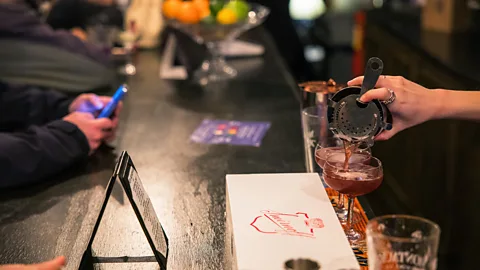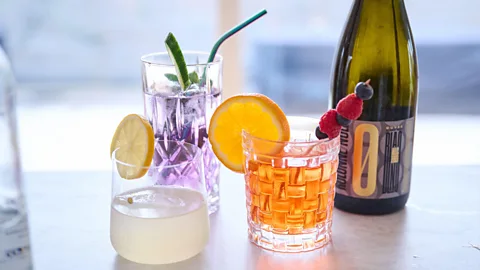Is 'dry tripping' taking over Spring Break? Inside the new trend
 Getty Images
Getty ImagesMore Gen Zers are aiming for "dry tripping" this Spring Break. And no, it doesn't involve psychedelics.
Micah Dusseau goes to bars with his friends three nights in a row when he’s on holiday. "There’s no hangover, so we can stay out at the bars however late we want," the 24-year-old who lives in Columbus, Ohio, said. Like many Gen Z travelers, he is alcohol-free when he travels, and even his friends who drink admire his choices. "They end up not drinking as much," he told BBC Travel.
For decades, many people's holidays revolved around indulgence and nightlife. Now, "dry tripping," the concept of travelling without alcohol, is poised to skyrocket in popularity and shift the conversation.
"I'm not trying to get other people around me to stop drinking because I know that that's not plausible," 26-year-old Mary Honkus, a New York-based writer, told BBC Travel. "And everyone has a different relationship with alcohol. But it’s rewarding to me," she added. "I can still have so much fun and enjoy myself while in a beautiful location without that alcohol."
Capitalising on vacation
It's clear that today's younger generations aren’t as enamored by alcohol as their predecessors. In fact, more than half of American legal drinking-aged Gen Zers – approximately 54% – haven’t had alcohol in the past six months, according to International Wine and Spirit Research (IWSR).
So, when it comes to travel, Gen Zers and even Millennials can find dry tripping to be a natural and appealing decision. After all, you are likely to get more out of your vacation – physically, emotionally and financially – when you cut alcohol out of the equation: When you’re sober, you’re more likely to have a solid night of sleep, so waking up early might feel less daunting and participating in physical activities will likely feel more doable, and dining out is certainly more affordable.
"Alcohol-free travel allows for hangover-free travel, which I think we can all get behind," Elizabeth Gascoigne, founder and CEO of Absence of Proof, a non-alcoholic events company and distributor, told BBC Travel.
 Getty Images
Getty ImagesTravelling takes a toll on your body, "from long-distance drives to the dreaded jet lag," Victoria Watters, co-founder of Dry Atlas, a media company that focuses on alcohol alternatives, told BBC Travel – and drinking can certainly add to that drain. If you remove alcohol from the equation, however, you’ll naturally feel better, Watters said. Plus, she noted that as health consciousness continues to rise and social norms evolve, dry tripping isn't only changing how some people travel, but also how people date and attend social events such as weddings.
And, she explained, along with physical benefits, there are psychological benefits to cutting out alcohol. Alcohol is a depressant and without it, Watters said, people are more likely to enjoy their holiday. "The greater the amounts of alcohol consumed and the more regular the intake, the more likely a person will be to develop temporary anxiety and depressive symptoms," according to the National Institute of Health.
In the same way that hotel gyms draw in people who want to live healthy lives – and exercise away from home – travellers are placing an importance on maintaining an alcohol-free lifestyle while experiencing a new destination, Hilary Sheinbaum, author of The Dry Challenge and founder of GoingDry.co, a non-alcoholic event and menu curation company, told BBC Travel.
This change challenges our association with the "five-o’clock-somewhere" attitude towards holidays, Watters pointed out, adding that "sober curiosity" and alcohol alternatives aren’t just fads. "They’re here to stay," she said.
"With the help of social media, more people are talking about it and embracing it," Honkus said, pointing to TikTok as a platform where people are "open and honest about their journeys." The reinvention of self-care and mental health is also a contributing factor to the shift, she said. "I feel like people are starting to realize it’s doing a lot more harm than good," she added, referring to drinking alcohol.
 Alamy
AlamyBusinesses are catching on
Airlines and hotels are adapting accordingly, offering non-alcoholic mocktail and beer options on their menus. And when businesses focus on offering non-alcoholic options, booze-free travel becomes more accessible. "Gen Z drinks less than the generations before them, so hotels, bars and restaurants are catering to their likes and requests," Sheinbaum said.
Delta, JetBlue and Alaska Airlines all have non-alcoholic offerings, serving mocktails and non-alcoholic beer both in-flight and in lounges. Delta passengers can order mocktails like the "Citrus Fizz" or the "Pomegranate Lemon Cooler," and Alaska Airlines offers Best Day Brewing, a craft non-alcoholic beer, on every flight. JetBlue also serves Athletic Brewing non-alcoholic beer on all of its domestic flights.
Watters said cruises aren’t far behind. Virgin Voyages, for example, revamped its mocktail menu, aiming to be "the best cruise line for non-drinkers." The Disney Cruise Line is also focusing on mocktails, teaming up with non-alcoholic cocktail company Free Spirits.
Hotels are leaning in, too. “Hotels are rolling out delicious mocktails, adaptogen drinks, teas and serotonin sodas,” Melanie Fish, chief trend tracker for Expedia Brands, noted in an Expedia report.
Hilton offers mocktails that feature Lyre’s non-alcoholic spirits, and Marriott added non-alcoholic drink options to its lounges and bars, Watters pointed out. Sheinbaum said hotel beverage directors have a clear understanding of the shift. The Fairmont Kei Lani in Maui, for example, has non-alcoholic cocktails on both its bar and restaurant menus, and the hotel’s beverage director has been sober for more than two years.
The UK is ahead of the curve
When you pair Gen Z’s lack of interest in drinking with the generation’s preference for spending money on experiences rather than things, you have a strong consumer base for non-alcoholic options in the travel space, Watters said.
She pointed out that the UK is particularly focused on this shift, launching travel agencies – like We Love Lucid – that are dedicated to alcohol-free tourism.
Sheinbaum echoed the sentiment. "The US is definitely catching on, but the UK is where Dry January started and also where many nonalcoholic beverages have emerged," she said.
"Cutting alcohol out of a vacation will make the journey more meaningful and fulfilling," Dr. Subhash C. Pandey, director of the Alcohol Research Center at the University of Illinois at Chicago, told BBC Travel. He added that both preclinical and clinical studies suggest that alcohol does not have any beneficial effects on the body.
---
Join more than three million BBC Travel fans by liking us on Facebook, or follow us on Twitter and Instagram.
If you liked this story, sign up for The Essential List newsletter – a handpicked selection of features, videos and can't-miss news delivered to your inbox every Friday.
